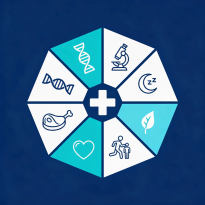7 Powerful Reasons Why Treatment Fails (And How the 8 Constitution Diet Can Change the result)
1. Introduction: When Healing Stalls
Healing journeys rarely follow a straight path. Especially in clinical practice, the second and third appointments often prove more complex than the first. While students of medicine may focus heavily on diagnostics, the real challenge often lies in understanding why effective treatments don’t always work as expected. This article is crafted to serve both practitioners and patients, offering insights into how to navigate and troubleshoot therapeutic plateaus.
2. Incorrect Diagnosis or Treatment Plan
Although misdiagnosis is often the first assumption when a treatment doesn’t work, it’s not the most common reason. When diagnosis or treatment is incorrect, the body typically signals it early on, allowing for a relatively quick correction. How to Identify a Faulty Diagnosis:
- No change or worsening of symptoms in the first few sessions.
- The treatment seems irrelevant to the core issue.
- Conflicting assessments from multiple professionals.
What to Do: Visit two or three different clinics. Cross-check diagnoses and see if a consistent pattern emerges. If not, it may be time to reassess the original treatment direction.
3. Insufficient Treatment Duration
Healing takes time, and expecting immediate results often leads to disappointment. Similar to investment graphs, recovery can include dips, plateaus, and unexpected spikes.
Key Points:
- Some cases show fast initial improvement but plateau.
- Others have slow starts but remarkable final outcomes.
- Consistency is key; giving up too soon can waste a potentially effective approach.
The key is patience. Stick to a well-constructed treatment plan for a reasonable period—often longer than initially expected—before judging its effectiveness.
4. Hidden Aggravating Factors in Daily Life
Even with the right treatment, persistent exposure to aggravating factors can neutralize progress. Healing isn’t just what’s done in the clinic—it’s also what happens outside of it.
Common Aggravating Factors:
- Poor posture
- Psychological stress
- Irregular or unhealthy eating habits
- Sedentary lifestyle
- Inadequate or low-quality sleep
Even reducing these negative influences slightly can dramatically improve treatment results. 
5. The Power of the 8 Constitution Diet
The 8 Constitution Medicine system classifies people into eight unique types based on organ dominance and balance. Each type has a distinct set of compatible and incompatible foods that can significantly influence treatment outcomes.
Why the 8 Constitution Diet Matters:
Imagine someone with a Hepatonia constitution suffering from chronic eczema. If they regularly consume foods that disrupt liver function based on their type—like high-fat meats or alcohol—even expert medical care may fall short. Matching dietary intake with constitutional needs can amplify treatment effectiveness.
6. When Diet Becomes a Treatment
For many, especially those with chronic or complex conditions, diet is more than supportive—it’s therapeutic.
8 Constitution Diet Clinical Examples:
- Pulmotonia types may thrive on a high-fat, low-carb diet and react poorly to certain grains.
- Renotonia types benefit from lighter, plant-based meals and need to avoid excessive protein.
Aligning one’s diet to their constitution isn’t just about nutrition—it’s about biochemical harmony. Proper food choices can often trigger significant health improvements even when traditional treatments stall.
7. Psychological and Emotional Blocks
Unspoken worries, anxiety, and mental fatigue can create invisible walls to recovery. Emotional well-being plays a crucial role in physical healing.
Impact of Emotional State:
- Stress hormones interfere with digestion, sleep, and immunity.
- Anxiety may cause patients to self-sabotage treatment by skipping doses or altering routines.
- Lack of belief in treatment can manifest psychosomatic resistance.
Supporting patients emotionally is just as vital as prescribing the right herbs or techniques.
8. Doctor-Patient Communication Breakdown
Subtle lies—“I didn’t skip a dose” or “I followed all dietary guidelines”—can accumulate into significant obstacles. Often these aren’t deliberate; they’re driven by shame, forgetfulness, or misunderstanding.
Tips for Better Communication:
- Practitioners should foster a non-judgmental environment.
- Patients should feel safe discussing difficulties honestly.
- Open conversations about expectations, lifestyle, and limitations can resolve many unspoken issues.
9. Reassessing from a Holistic Perspective
When healing stalls, it helps to zoom out. What pieces might be missing?
Look At:
- Other conditions or medications interacting negatively
- Overlooked environmental stressors
- Interdisciplinary feedback—collaboration can often uncover blind spots
10. Role of Environment in Healing
Healing doesn’t happen in isolation. The quality of one’s surroundings can directly affect treatment outcomes.
Environmental Factors That Matter:
- Noise levels during sleep
- Air quality
- Home vs. clinical setting energy
Creating a supportive healing environment enhances both physical and emotional recovery.
11. Monitoring Progress: Beyond Symptoms
Progress isn’t always about symptom relief. Sometimes it’s about energy levels, mental clarity, or digestion improving—even when the main issue seems unchanged.
Functional Improvements:
- Increased daily stamina
- Better sleep and appetite
- Reduced medication dependency
Celebrate these signs—they’re proof of deeper healing at work.
12. The Student Clinician’s Perspective
Beginner clinicians often find it easier to make initial diagnoses than to troubleshoot when results don’t show. Textbooks can’t teach every nuance. Real Lessons Come From:
- Following patients over time
- Reflecting on unsuccessful treatments
- Mentorship and real-world practice
13. Empowering the Patient’s Role
Recovery is a partnership. The more informed and proactive the patient, the better the outcomes.
Ways Patients Can Help:
- Ask questions and understand their diagnosis
- Follow lifestyle recommendations closely
- Communicate challenges honestly
14. Adjusting Treatment Based on Response
Sometimes persistence pays off; other times, it’s a sign to pivot.
Signs to Adjust:
- New symptoms emerge or worsen
- Plateau persists over months with no shift
- Patient’s condition or life situation changes
Clinicians should constantly evaluate progress and adjust accordingly.
15. Recap: A Checklist When Progress Stalls
Before abandoning treatment, check:
- Is the diagnosis accurate?
- Has enough time passed?
- Are there lifestyle or psychological blockers?
- Is the diet aligned with constitution?
- Is there honest communication?
16. FAQs
Q1. What if my symptoms worsen after starting treatment? Mild flare-ups can occur as part of a healing crisis. If symptoms persist or intensify, consult your practitioner.
Q2. How can I know if I’m following the right 8 Constitution Diet? Get your constitution assessed by a certified practitioner and follow the tailored plan.
Q3. Can I combine the 8 Constitution Diet with Western medicine? Absolutely. Many patients benefit from combining constitution-based nutrition with standard treatments—just make sure all practitioners are informed.
Q4. When should I consider changing my doctor? If communication breaks down or progress stalls despite adjustments, a new perspective may help.
Q5. What lifestyle changes help healing the most? Improved sleep, reduced stress, regular meals, and basic movement can make a big difference.
Q6. How do I talk honestly with my doctor about noncompliance? Be open. Most practitioners appreciate honesty—it allows them to better tailor your care.
17. Conclusion: Every Problem Has a Solution
No healing journey is without bumps. Whether you’re a student clinician trying to refine your craft or a patient wondering why things haven’t clicked—know this: every problem has a solution. With a clear mind, honest reflection, and the right support, breakthroughs are always within reach.
For the original Korean text, visit here. If you’re curious about the basics of traditional Korean medicine and health, read the following article:
What Your Sleeping Position Says About Your Health
Learn Why Studying JangSang Medicine is Important.
Frequently Asked but Silly Questions (Foods Good for the Liver??) Why Full, Thick Hair Is Considered Beautiful: The Fascinating Reasons Behind It (Hair Loss Story #1)
